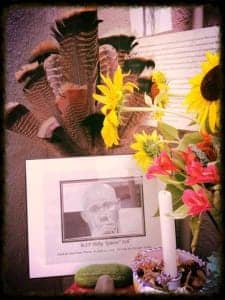One year ago, on July 8, 2013, 30,000 California prisoners initiated the largest hunger strike the world has ever seen. Sixty days later, 40 prisoners, who had eaten nothing in all that time, agreed to suspend the strike when state legislators promised to hold hearings on ending solitary confinement, the heart of their demands.
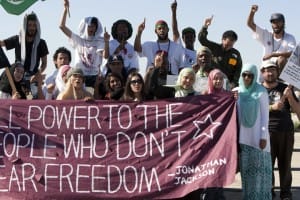
The 2013 hunger strike followed two in 2011 in which participation peaked at 6,600 and 12,000. In the interim, effective October 2012, the hunger strike leaders, representing all racial groups, issued the historic Agreement to End Hostilities, which has held with few exceptions throughout the California prison system ever since.
These statements, most by hunger strike participants, arrived in time for the July 8 anniversary, and more will be added as they arrive. The Bay View thanks Freedom Archives and the Prisoner Hunger Strike Solidarity coalition for providing them.
We the people
by Mutope Duguma (James Crawford)
What we learned this far in our protracted struggle is that We the People are the vanguard. We the People have to demand what we want for ourselves. No government, no power, no authority and no one should be able to trample over the People without the People rising up and saying, “Under no circumstances do We the People accept this in our name.”
We the People reject torture of human beings,
We the People reject mass incarceration of our sons and daughters,
We the People reject police brutality,
We the People reject poverty,
We the People reject solitary confinement,
We the People reject Security Threat Groups and Step Down Programs,
We the People reject oppressive prison conditions
In solidarity.
We the People reject violence
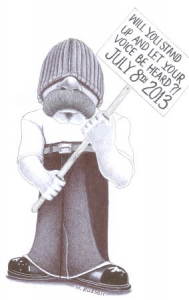
Our unity is our strength. If we learn to cultivate our unity, we can begin to reshape this world – back into a world that reflects our humanity – because there is too much pain and suffering in the world today that only our unity will end. We’ve got to be unapologetic and always be dedicated and serious about the revolutionary change we seek.
Violence only perpetuates more violence inside of the vortex of violence, the senseless taking of lives, like a timeless hour clock that never ends, feeding on the very lives of our families and friends.
An end to all hostilities means peace amongst the oppressed, where our children can focus on school and living their lives peacefully, while they develop into strong young men and women.
An end to all hostilities means peace for the elderly and worrisome minds, where they can take peaceful walks during any time of day or night, sit out on their porches and watch the moon and stars in the sky.
An end to all hostilities means peace where young men and women can go into any neighborhood to socialize with fellow human beings without fear of being attacked or murdered.
An end to all hostilities means peace where all races in the free society can coexist without worrying that their race or class will be a hazard to them.
During our strikes to end all hostilities – July 1 to July 20, 2011; Sept. 26 to Oct. 14, 2011; and July 8 to Sept. 4, 2013 – we men and women got together and said enough already!
An end to all hostilities is solidarity.
Send our brother some love and light: Mutope Duguma, s/n James Crawford, D-05996, PBSP SHU, P.O. Box 7500, Crescent City, CA 95532.
Weighing sacrifices against successes, the price was too high, but the struggle moves forward
by Antonio Guillen
Greetings to one and all,
It has been three years since the commencement of the first hunger strike.
As I look back over that time to weigh our sacrifices against our successes, I have to admit that the accomplishments we’ve achieved thus far do allow me to be somewhat optimistic about the future. I cannot help, however, but remain angered at the cost of human life and damaged health we suffered simply to enact change – the price was way too high!
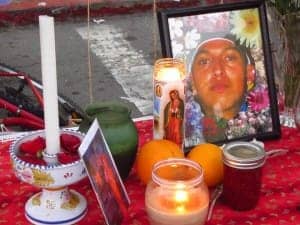
And, although our accomplishments appear promising, in no way am I suggesting that we’ve succeeded in our overall struggle, which is to end long term solitary confinement and to better the living conditions of all SHU facilities – we are on our path, though!
As always, it’s of the upmost importance to acknowledge family and friends on the outside, who through your unwavering support have made it possible for us to be who we are today. Each of you, through your contributions and sacrifices, be they personal or collective, have helped pave the way for this struggle to move forward. And we on the inside will forever be grateful!
Power to the people.
Strength and respect,
Antonio Guillen
Send our brother some love and light: Antonio Guillen, P-81948, PBSP SHU, P.O. Box 7500, Crescent City, CA 95532.
Today we celebrate our movement
by Todd Ashker, Sitawa Nantambu Jamaa and Arturo Castellanos
This is the third anniversary since we began using peaceful actions collectively to push for an end to the use of longterm solitary confinement. If we look back and remember before July 2011, we prisoners were alone, isolated, not being heard. We wrote newspapers and nothing was printed. We wrote lawmakers and never heard back.
Few people knew how many of us were locked away in windowless cells for 23 hours a day – often more – here in California. Few understood how many others are kept in various forms of isolation here in our state in other SHUs, Ad Seg cells, mental health cells – including women and juveniles.
Almost no one understood California’s place as the state that uses solitary confinement the most of anywhere. California is the only state that puts people in longterm endless solitary confinement for mere association, without any violent behavior.
California uses solitary confinement more than anywhere else. And California is the only state that puts people in longterm endless solitary confinement for mere association, without any violent behavior.
Our July 2011 hunger strike and the hunger strike of prisoners at Guantanamo Bay struck a nerve about the mistreatment of prisoners in the United States. We are most grateful that we got your attention, our supporters – activists, lawyers – and the nation and the world.
Twelve thousand prisoners across the state started the September 2011 hunger strike. Thousands lasted for several weeks before we suspended it with promise of talks. Our second hunger strike was short but big.
Our July 2013 hunger strike was historic: 30,000 prisoners in California, by CDCR statistics, refused food at the beginning and we were joined by prisoners across the country. Officially 40 people lasted 60 days. No one was force fed. We know that it was more than 40, but even one person lasting 60 days is historic.
The California, national and world press suddenly focused on the shame of California’s prisons. Even Scientific America had an editorial, “Solitary Confinement Is Torture.” United Nations Special Rapporteur on Torture Juan Mendez spoke out against our endless confinement.
We are so grateful so many of you heard us and joined us and have joined with us. When we began, the saying within our walls was “Parole, snitch or die.” Now 69 percent of Secure Housing Unit (SHU) prisoners have been released to general population. Most of the others have been placed in steps supposedly on the way to the general population.
This is an admission, by data of the CDCR itself, that California has misused and overused isolation. There have been changes to visiting rules at Pelican Bay but not in other state SHUs. We have more canteen items, spices for our miserable food and clothing items so that we are not as cold in the winter. These are big victories.
But California has filled the SHU cells up as fast as they have emptied. California still isolates prisoners endlessly without any violent behavior. The conditions of isolation remain torturous. There is still lots to change.
California has filled the SHU cells up as fast as they have emptied. California still isolates prisoners endlessly without any violent behavior. The conditions of isolation remain torturous. There is still lots to change.
Today we celebrate our movement. We do not rely on the legislature or the courts alone. Only by a strong growing movement of those of us inside and our supporters outside do we have any hope of making all the changes that we need. You keep CDCR’s feet to the fire. We are grateful that you stand with us.
Send our brothers some love and light: Todd Ashker, C-58191, PBSP SHU, P.O. Box 7500, Crescent City CA 95532; Sitawa Nantambu Jamaa (R.N. Dewberry), C-35671, PBSP SHU, P.O. Box 7500, Crescent City CA 95532; and Arturo Castellanos, C-17275, PBSP SHU, P.O. Box 7500, Crescent City CA 95532.
Work together to keep the pressure on
by Phil Fortman
July 8th is a date that made history around the world last year – 30,000 prisoners began a hunger strike in the state of California due to the inhumane conditions of solitary confinement.
The strike did not come about as a spur of the moment idea. No, these inhumane conditions have been worsening year after year, decade after decade until the outside and inside finally joined together in a movement for change.
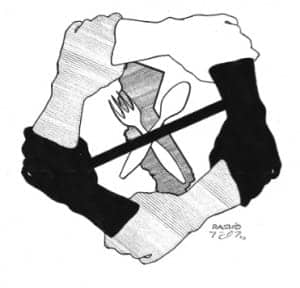
The change started on July 1, 2011, and Sept. 26 of the same year, which set the course for the Big One – the one that got the attention of the world to show how prisoners are being treated, not only in California, but in most states of this country.
I applaud us all, prisoners and advocates alike, those who participated in the hunger strike and worked so hard for our case.
Looking back on this year, I see progress being made toward closing these holes – not as fast as we’d like, but the crack has been formed. The light is now beginning to seep in upon these dark, dreary walls for once.
In order to widen the crack until these walls come crashing down, we need to work together to keep the pressure on and on. We, as prisoners inside these places, have been advocating an end to hostilities among us. This attitude, along with the continued help and support of you good folks out there, will hopefully bring about a more civilized society and for us to live in peace and harmony.
I thank us all.
Send our brother some love and light: Phil Fortman, B-03557, PBSP SHU, P.O. Box 7500, Crescent City, CA 95532.
Women prisoners speak out on solitary and hunger strike anniversary
Alicia Zaragoza: Solitary is torture. It humiliated me. They strip you of everything – I was only given a mumu and half a mattress. You are locked away with no answer. I was cold, tired and hungry. The other ladies in Ad Seg helped me out and also the ones on Death Row, which is right nearby, gave me stuff to survive.
The hunger strike last year was amazing. The guys went through hell, but it was so good for them to come together!
Send our sister some love and light: Alicia Zaragoza, X-07564, CCWF, P.O. Box 1508, Chowchilla, CA 93610.
Natalie De Mola: Solitary confinement in all ways is cruel. If it is a form of abuse to keep a child locked away in a closet for long periods of time, then why is it not abuse to keep that same child, who is now a man, locked in a cell for years? Put yourself in their shoes! I supported the hunger strike.
Send our sister some love and light: Natalie De Mola, X-12907, CCWF, P.O. Box 1508, Chowchilla, CA 93610.
Fonda Gayden: As a youth, I wanted to be protected and loved. I was in and out of prison because I was scared of my abusive parents. To survive, I had to lash out, to do ugly things. I spent time in solitary. Being in solitary made me more vicious – that was the expectation I was living up to. I had no empathy, no compassion.
I want to leave this world with human dignity. I want someone to be able to say, “She was a good person.” It takes a lot to achieve that.
Solitary only breaks people. To be away from people is insanity! It did something to me. I judged all people as bad, since that’s all I experienced.
We need to be able to talk to each other, to touch. To continue to punish people instead of trying to help them is not the solution; it is wrong. Just talking with someone like me for 15 minutes a day would do wonders.
I’ve been on hunger strikes before and it does not feel good. But if the only way I can be validated as a human being is going on a hunger strike, I’d rather not eat.
I need human dignity more than I need food. In solidarity with the men, a lot of us refused to go eat. When you feel you’re right you have a right to be heard! Solitary does not work. You can’t release someone from solitary into the society. We have to get rid of it!
Send our sister some love and light: Fonda Gayden, W-14594, CCWF, P.O. Box 1508, Chowchilla, CA 93610.
Chi Chi Locci: As a child of the ‘50s and a ‘60s activist, I want to quote Gandhi: “Be the change you want to see in the world.” We, together, with a common cause, create the change which grows massive.
I walked with masses in the March on Washington. Here I am a voice for those who can’t speak for themselves. The hunger strike helps transform our complaints into the change in the world.
Send our sister some love and light: Chi Chi Locci, W-92797, CCWF, P.O. Box 1508, Chowchilla, CA 93610.





